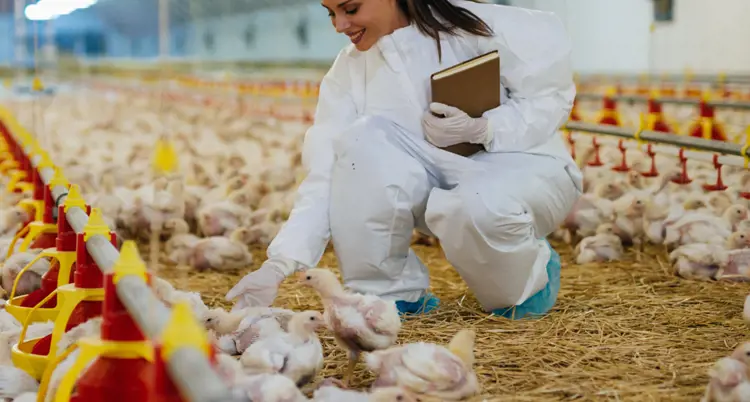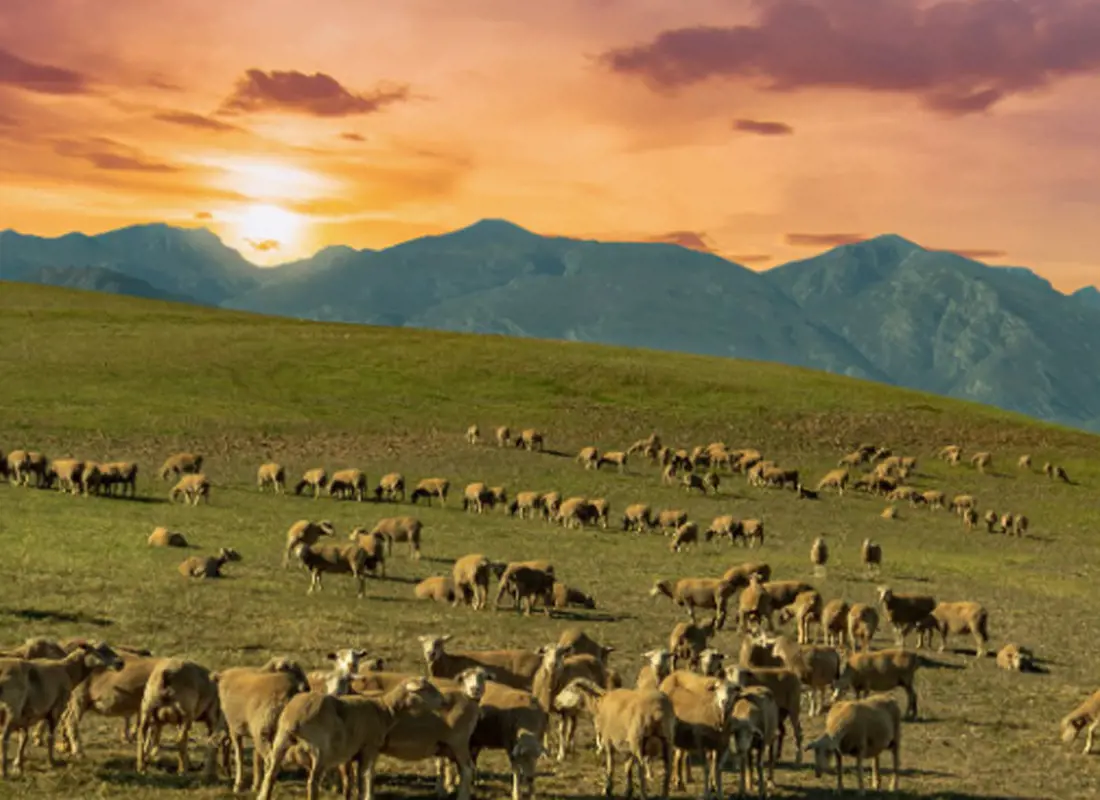Helping farmers in South Africa reduce their use of antibiotics
Antibiotic resistance is a major threat to human and animal health. De Heus is committed to not only eliminating antibiotics from its feed by 2030, but also to helping farmers reduce their use of antibiotics as a preventive measure against disease. The EU has already introduced regulations restricting the routine use of antibiotics in agriculture, but in countries like South Africa, legislation governing antibiotics is still lenient. As a result, administering antibiotics to animals is an everyday practice on South African farms.

At De Heus South Africa, Michel Bradford, Product Manager Pigs & Poultry, and Chris Prinsloo, Head of Sustainability, tell us about the challenges of reducing antibiotic use, the drivers for change and the measures they are taking to encourage farmers to alter course.
Creating awareness
“There’s widespread use of antibiotics in animal feed in some countries, including South Africa,” says Michel. “We need to improve how we manage use of antibiotics so they’re used more prudently.” One of the obstacles to more responsible antibiotic use is an absence of awareness. “From our local experience, there’s a lack of understanding about the complexities and dangers of antibiotic resistance,” explains Chris. “This undermines our goal of increasing their prudent use, therefore building awareness has to be part of our local strategy.”
“Building awareness has to be part of our local strategy.”
Consequences of fewer restrictions
The EU has strict regulations governing the use of antibiotics in animal feed and on farms, but the situation is very different in South Africa. “As long as antibiotics are used according to the supplier recommendations, a farmer doesn’t require authorisation from a vet,” says Michel. “A prescription is only needed for high-powered antibiotics.” Because of these relatively loose rules, South African farmers can administer antibiotics as they see fit, but they may not always be making the correct choice. “Looking at antibiograms which measure the impact of antimicrobial drugs, these antibiotics are no longer as effective,” Michel adds. “Antibiotic resistance is becoming a big issue and it’s very concerning.”
Legislative and market pressure
With growing unease in other parts of the world, South Africa is looking at making legislative changes. “About three years ago, the government published a draft document on controlling antibiotic use in the food industry, so legislation is on the way,” says Michel. “We want to prepare farmers for when that time comes.” The market will also have an impact. “South Africa is part of the global economy,” continues Michel. “More and more international retail companies and fast food chains will expect producers to use antibiotics as little as possible.”
Lack of urgency
Irrespective of legislation and market forces, De Heus wants to do what’s best for human and animal health and eliminate critical antibiotics and their preventive use in feed by 2030. This applies to every business unit, but not all countries will achieve that objective at the same time. “It will be more challenging in Africa and Asia,” says Michel. “2030 is a short time frame for a country like South Africa. We have a lot of work to do.” In the first instance, this work involves overcoming farmers’ resistance to change. “There isn’t the same level of urgency with all stakeholders,” says Chris. “Profit is still the key driver and farmers are already grappling with the country’s inadequate energy infrastructure and the associated costs of generating their own power.”
Community projects
Antibiotics have been in use for such a long time in South Africa, there’s a nervousness about future restrictions. “If you’re going to reduce antibiotics, especially for prophylactic use, on-farm management will have to change significantly,” explains Michel. “That means improving housing and facilities.” Many farm facilities in South Africa are relatively old with little or no environmental controls. Upgrading these facilities will come at a financial cost. Reducing antibiotic use will also mean reducing production pressure on livestock. “For example, if a farmer wants to grow a broiler chicken weighing 1.9 kg in 32 days with a feed conversion ratio of about 1.5, removing antibiotics from the process will make it more difficult to achieve,” says Michel. “That’s why many customers say they’ll continue using antibiotics while they can and change when they have to.”

Early adopters
Another argument farmers make is that Africa is not Europe. “People are more affluent in the EU,” says Michel. “So it’s easier for producers to pass on the additional costs to consumers.” In South Africa, big integrators will be better able to afford the extra costs while small producers will find it more difficult. “Some of our customers are more aware of concerns about antibiotics than others,” says Michel. “I know several pig farmers who rarely use them, and some broiler chicken producers profile themselves as not using antibiotic growth promoters and sell birds in niche markets.” But these farmers are in the minority. “If change comes too quickly, either through legislative or market pressure, some farmers may go out of business,” adds Michel. “That’s why we are trying to prepare our customers. One solution we need to find is how can small and developing farmers afford veterinary support. When an animal is ill, it has the right to be treated with antibiotics if required, but the cost of a vet can be prohibitive.”
De Heus Natural Power Programme
To encourage farmers, Michel, Chris and their colleagues are using the De Heus Natural Power programme. It offers a holistic set of solutions that target optimal nutrition, farm management and animal health. “The Natural Power programme focuses on keeping animals healthy rather than just reducing antibiotics,” explains Michel. “Farm management has a big impact on animal health, so by helping producers improve water quality, housing and climate, we can show them that they can produce robust animals without antibiotics.” The programme also encourages vets and other stakeholders to work together as a team. “Natural Power provides a uniform structure for all to follow,” says Chris. “It’s an understandable concept.”
Starting with the basics
“If you start with the end goal, you lose the customer in the first few minutes,” says Michel. That’s why the Natural Power programme takes a step-by-step approach to better animal health. One of the ways De Heus South Africa initiates the discussion with farmers is by producing reports that detail the antibiotic usage per customer per order. “By showing customers which antibiotics they’re using in what feed, we can start talking about how they can reduce them and what we can do to help,” says Michel. To get farmers on board, Michel and his team emphasise initial, low-cost measures that can be taken. “For instance, biosecurity can be expensive with controlled access, a shower unit and clean clothes,” explains Michel. “But if farmers start with managed entry and exit points, and a change of footwear with indoor and outdoor boots, we can show them that they don’t have to incur huge initial costs to begin making a difference.” Similarly, farmers can start monitoring water quality and then install a filtration system later. “If they make changes gradually and spread the costs over a period of years, farmers will feel that the goals are achievable,” continues Michel.
“If you start with the end goal, you lose the customer in the first few minutes. That’s why the Natural Power programme takes a step-by-step approach to better animal health.”
Sharing knowledge and experience
In addition to this one-to-one approach, De Heus South Africa organizes farmer days where experts discuss subjects like biosecurity, water quality and intestinal health with producers. In particular, vets present the risks of antibiotic resistance. The Natural Power programme also uses articles and social media, not just to spread the message to farmers but also share experiences between De Heus business units. “Although we’re in different countries and use different approaches, we’re in similar situations,” says Michel. “We can all learn from one another so we’re not reinventing the wheel.”
Attitude shift
Although the Natural Power programme is in its early stages in South Africa, Michel and Chris are starting to see a shift in momentum. “Some farmers have a long way to go, but others are coming on board and are keen for De Heus to help,” says Michel. “If we can get farmers to the end goal in a way that’s affordable and achievable, we will succeed.”


